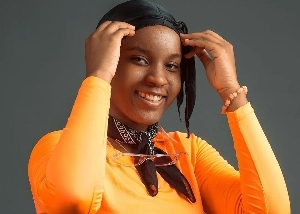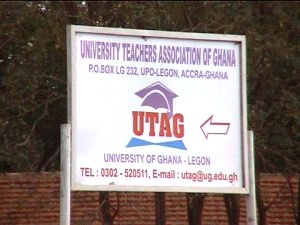General News of Tuesday, 2 June 2020
Source: peacefmonline.com
UTAG consults members over return to lecture halls
The University Teachers Association of Ghana (UTAG) has revealed that it is consulting its members on whether or not to return to the lecture halls.
The National President of UTAG, Professor Charles Marfo told Class News in an interview that following President Nana Akufo-Addo’s staggered easing of the COVID-19 restrictions last Sunday to allow final-year students (BECE, WASSCE, Diploma, Degree) across the country to go back to the classroom on 15 June 2020 to prepare for their exit exams, the lecturing body’s members were torn between taking the risk and holding back until a later time.
Prof Marfo said even though UTAG was not consulted before the decision was made, “we are still collecting views from our members.”
He added: “People are concerned, nervous and worried but there is a good number of us that are OK with it. This is because they think we should move forward, considering the fact that this pandemic is going to be with us for a long time and, so, we should, perhaps, ingeniously find ways of living with it.”
Prof Marfo said no matter the outcome of the ongoing consultation process, adherence to the safety protocols, as directed by the President, was of utmost importance.
He also beseeched the government to do the right things to contain the spread of the COVID-19 pandemic.
While announcing the easing of the restrictions on Sunday, 31 May 2020, President Akufo-Addo noted that “we have conducted two hundred and eighteen thousand, four hundred and twenty-five (218,425) tests; the number of positive cases stands at eight thousand and seventy (8,070); two thousand, nine hundred and forty-seven (2,947) persons have recovered; thirty-six (36) have sadly died; thirteen (13) persons are severely ill, with three (3) critically-ill for which (1) is on a ventilator; and five thousand and eighty-seven are responding to treatment at home, isolation centres and hospitals”.
He said: “Our hospitalisation and death rates have been, persistently, very low, some of the lowest in Africa and in the world. The Ghanaian people are not dying of the virus in the hundreds and thousands that were earlier anticipated, and that are being seen on a daily basis in some other countries. Indeed, we are witnessing a much milder manifestation of the virus in the country, than was initially feared. And, I dare say, that it is the grace of God, and the measures taken by Government that have produced this result”.
The President added: “Our ability to trace, test, and treat persons with the virus has improved considerably; we now have a large army of efficient contact tracers; we have expanded the number of testing facilities from two (2) to ten (10) across the country; and we have increased appreciably the number of quarantine, isolation and treatment centres.
“We have lessened our dependence on foreign imports, and scaled up significantly domestic production and distribution of personal protective equipment to our healthcare workers, evidenced in the provision of four million, four hundred and forty thousand, six hundred and ninety (4,440,690) gloves; three million, five hundred and twenty-four thousand, two hundred and five (3,524,205) nose masks; sixty-two thousand, one hundred and ninety-four (62,194) goggles; one hundred and nine thousand, eight hundred and twenty-nine (109,829) litres of sanitizers; eighty five thousand, nine hundred and ninety-five (85,995) head covers; eighty-two thousand, six hundred and fifty-five (82,655) gowns; fifty-three thousand, five hundred and seventeen (53,517) medical scrubs; and forty-three thousand, six hundred and thirty-three (43,633) N-95 face masks”.
“As I have already said, everything that has been achieved, so far, would not have been possible without the strong co-operation of you, the Ghanaian people. I know, at firsthand, the devasting impact the measures employed to defeat the virus has had on our social, religious, cultural and economic lives, as well as on our jobs, and the education of our children, and yet, because of the love of country, we have borne with them. I know, however, that we cannot live with these restrictions forever, and that it is imperative we find a safe way to return our lives to normality, as other nations across the globe, are trying to do.
“This has informed the stakeholder consultations that have occurred over the last few weeks with entities in the health, labour, religious, chieftaincy, educational, hospitality, transport, sports, tourism and creative arts sectors. These consultations have hinged on an analysis of the data gathered and the adoption of best practices and experiences of other countries that have attempted to move on in the wake of the pandemic.
“A consensus has emerged from these consultations that we should embark on a strategic, controlled, progressive, safe easing of restrictions to get our lives and economy back to normal. As I stated in my May Day address, a month ago, I am now in a position to outline the roadmap for easing safely the restrictions. Ours is going to be a phased approach, involving a selected list of public gatherings, based on their risk profile, socio-economic impact, and, most importantly, our capacity to enforce and to respond, in the event of a flair up in our number of infections.
“From Monday, 15 June 2020, the decision has been taken, after engagement with the Teacher Unions, whose co-operation I salute, to re-open schools and universities to allow for final year junior high, senior high and university students to resume classes ahead of the conduct of their respective exit examinations. Indeed, final year university students are to report to their universities on 15th June; final year senior high school (SHS 3) students, together with SHS 2 Gold Track students, on 22nd June; and final-year junior high school (JHS 3) students on 29th June. JHS 3 classes will comprise a maximum of thirty (30) students; SHS classes a maximum of twenty-five (25) students; and University lectures will take place with half the class sizes.
“All final-year students of educational and training institutions, which are being managed by Ministries other than the Education Ministry, are to return to school on 15th June to complete their exit examinations. Again, prior to the opening of schools and universities, the Ministry of Education, and the heads of public and private educational institutions, will fumigate and disinfect their institutions. Each student, teacher, and non-teaching staff will be provided with re-usable face masks by the Ministry of Education. For the avoidance of doubt, all other educational facilities, private and public, for non-final year students, will remain closed. The Minister for Education, in the coming days, will outline, in detail, the specific guidelines for the safe reopening of our schools and universities”.
Entertainment










